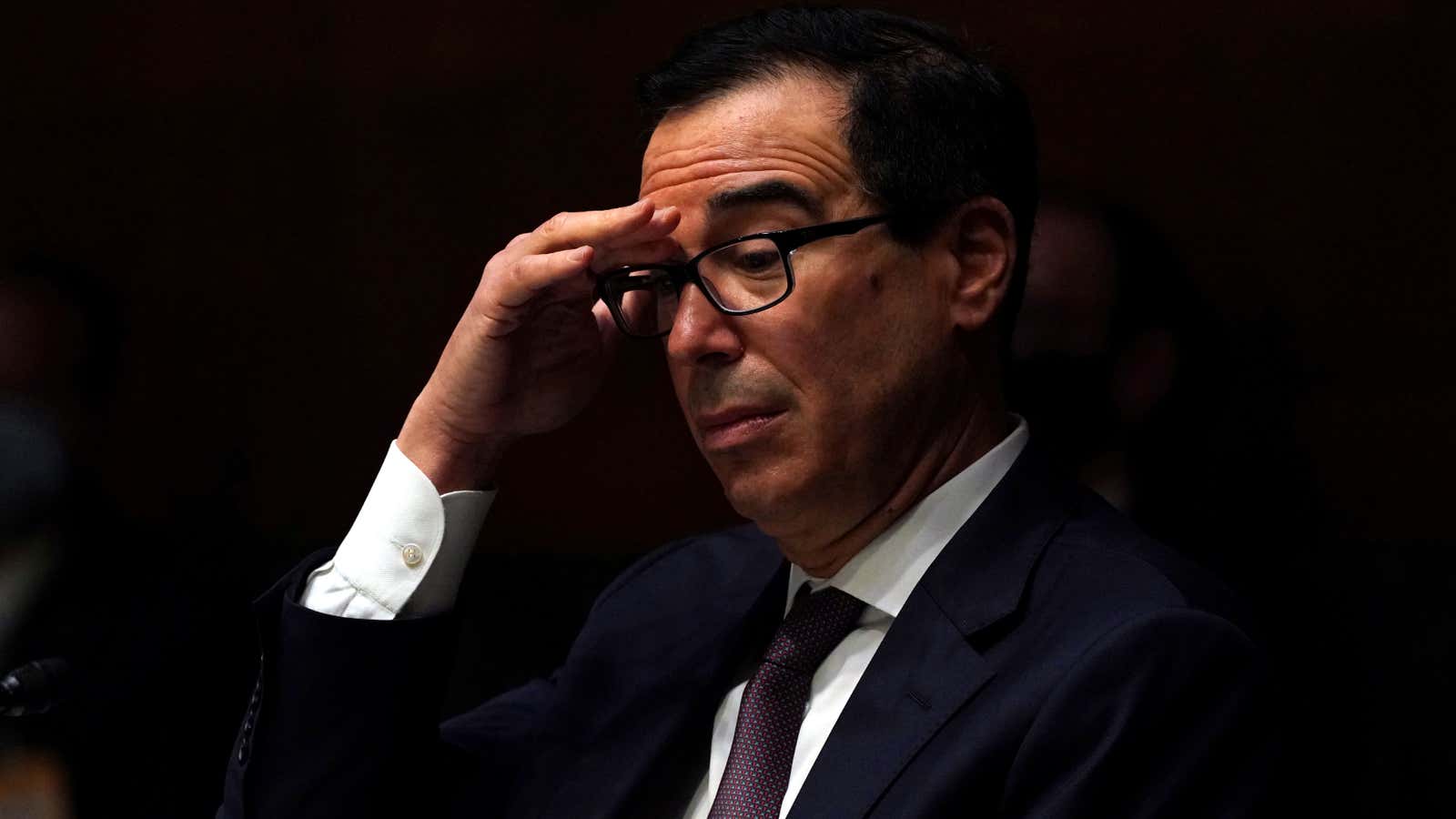The Trump administration asked the Federal Reserve to return $429 billion it received from Congress to bolster credit markets during the pandemic, and argued that the programs should terminate at year-end. The news, detailed today in a letter from Treasury Security Steven Mnuchin, could undermine the economic recovery.
There’s little reason to think these programs are unnecessary: New claims for unemployment began to rise again today, as coronavirus infections hit new highs, with deaths expected to follow suit. Most forecasters expect difficult conditions in the months ahead.
“The Federal Reserve would prefer that the full suite of emergency facilities established during the coronavirus pandemic continue to serve their important role as a backstop for our still-strained and vulnerable economy,” the central bank said today in a rare public disagreement with the Treasury.
In his letter, Mnuchin argued the Federal Reserve’s lending authority lapses on Dec. 31, citing his own role in writing the law, known as the CARES Act. Lawyers say the interpretation is a stretch. Bharat Ramamurti, a member of the panel appointed by Congress to oversee the Fed’s lending, says what expires is the Treasury’s ability to give the central bank additional funding, not the Fed’s authority to use what it has on hand.
The Fed has suggested in its statements that the law does allow its pandemic relief programs to continue with the agreement of the Treasury Secretary. Mnuchin’s attempt to end the program by blaming the statute is seen by many investors and Washington observers as motivated by the Trump administration’s desire to sow chaos for president-elect Joe Biden even as it refuses to acknowledge the former vice president’s victory in the election. The Trump White House’s decision stands in sharp contrast to president George W. Bush asking Congress for additional relief funds at the behest of president-elect Barack Obama during the 2008 financial crisis.
The central bank can still keep $195 billion of the funds that were already authorized to backstop the facilities until the end of the year, according to Ramamurti. Biden can reauthorize the CARES Act funding for the central bank after his Jan. 20 inauguration, but the nearly two-month gap could prove critical.
The Fed used the money it received from lawmakers to buy the debt of large American companies. It also made loans to cities and small and medium-sized businesses too large to seek pandemic rescue loans from the Small Business Administration. Only about $25 billion has actually been used in transactions, but the Fed’s ability to deploy the rest of its financial firepower gave confidence to private lenders and borrowers.
Absent these backstops, more businesses were likely to close and more workers would have lost their jobs. Even so, unemployment remains elevated, with 6.7% of Americans unable to find work. More than a third have been unemployed for six months or more, a group that increased by 1.2 million people last month, according to the Bureau of Labor Statistics.
As Mnuchin noted in his letter, market conditions have improved considerably since the March plunge accompanying the outbreak of the coronavirus in the US and Congress’ decision to grant the Fed and Treasury emergency lending powers. That legislation, the CARES Act, also sent many Americans a $1,200 check and expanded unemployment benefits—some of which expire later this month.
In an interview with Bloomberg News, Mnuchin suggested that Congress should use the money returned by the Fed to pay for a new relief bill. Economists across the political spectrum have called for another act to help Americans weather the pandemic safely without incurring long-term financial damage. Michael Strain, the director of economic policy studies at the conservative American Enterprise Institute, argued earlier this week that Congress should approve $1 trillion in aid.
Attempts to do so earlier in the year were scotched by Republican unwillingness to spend more than $500 billion. Other disagreements between the two parties ranged from whether businesses should be immune from coronavirus liability lawsuits and Democratic attempts to shoehorn a tax cut for high-income residents of high-tax states into the bill.
